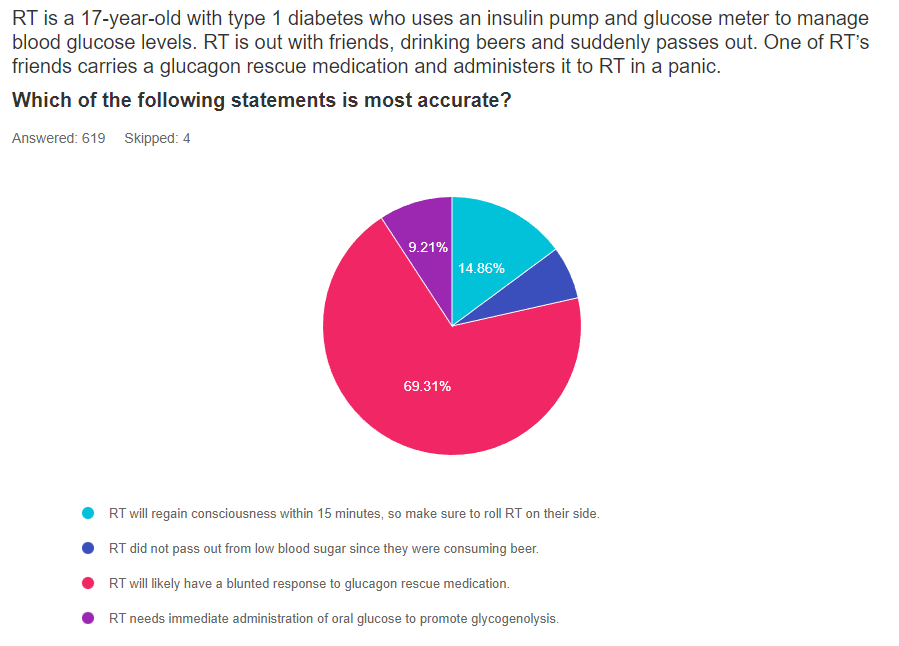
For last week’s practice question, we quizzed test takers on the best action for glucagon rescue medicine with beer. 70% of respondents chose the best answer. Great JOB. We want to share this important information, so you can pass it on to people living with diabetes and your colleagues, plus prepare for exam success!
Before we start though, if you don’t want any spoilers and haven’t tried the question yet, you can answer it below: Answer Question
Question:
RT is a 17-year-old with type 1 diabetes who uses an insulin pump and glucose meter to manage blood glucose levels. RT is out with friends, drinking beers and suddenly passes out. One of RT’s friends carries a glucagon rescue medication and administers it to RT in a panic.
Which of the following statements is most accurate?
Answer Choices:
- RT will regain consciousness within 15 minutes, so make sure to roll RT on their side.
- RT did not pass out from low blood sugar since they were consuming beer.
- RT will likely have a blunted response to the glucagon rescue medication.
- RT needs immediate administration of oral glucose to promote glycogenolysis.

Getting to the Best Answer
Answer 1 is incorrect. 15% chose this answer, “RT will regain consciousness within 15 minutes, so make sure to roll RT on their side.” Since alcohol consumption slows glycogen breakdown in the liver, higher levels of alcohol in the blood can delay and blunt the effectiveness of glucagon rescue medications. While we hope the RT regains consciousness quickly, there is a real possibility that it will take longer than 15 minutes. However, the second half of the answer offers sound advice. Since people often get nauseated and may vomit after receiving glucagon, it is a good idea to roll RT on their side. See our Blog for more info – Warning Alcohol can Blunt Impact of Glucagon
Answer 2 is incorrect. 5% of you chose this answer, “RT did not pass out from low blood sugar since they were consuming beer.” Although beer may contain some carbohydrate, the body considers alcohol a toxin and as soon as it reaches the bloodstream, the liver prioritizes metabolizing the alcohol and breaking it down. During this clean-up process, the liver is distracted from hormone signals that direct the liver to break down glycogen for energy and liberate glucose into the bloodstream. This clean-up can last for up to 8 hours, making delayed hypoglycemia a real possibility. See our Blog for more info – Warning Alcohol can Blunt Impact of Glucagon
Answer 3 is correct. 70% of respondents chose this answer, “RT will likely have a blunted response to the glucagon rescue medication.” YES, this is the best answer. Alcohol consumption slows glycogen breakdown in the liver, higher levels of alcohol in the blood can delay and blunt the effectiveness of glucagon rescue medications. When a person with type 1 diabetes drink alcohol, they at increased risk of hypoglycemia because the liver is less capable of breaking down stored glycogen.
Having a conversation with people with type 1 about the suppressive nature of alcohol on glycogen release for many hours after consuming alcohol is very important.
As a general rule of thumb, encouraging people with type 1 to eat 15gms of carbs with each drink and have a glass of water in between, may help make sure they have enough circulating carbs and slow the pace of alcohol consumption to help the liver with processing. They may also consider decreasing their insulin dose in association with alcohol intake to prevent this serious side effect. See our Blog for more info- Warning Alcohol can Blunt Impact of Glucagon
Finally, Answer 4 is correct. 9% chose this answer, “RT needs immediate administration of oral glucose to promote glycogenolysis.” This is a juicy answer. AFTER RT regains consciousness, they will certainly need to consume an oral form of energy to replete their glycogen stores and stabilize glucose levels. Of course, it isn’t safe to administer oral glucose when a person loses consciousness. Instead, emergency responders would administer glucagon or dextrose through an IV. See our Blog for more info- Warning Alcohol can Blunt Impact of Glucagon
Read more in our blog
Does Alcohol Intake Blunt Impact of Glucagon?
LS tells you that they frequently attend company mixers where they feel compelled to have at “least a few drinks”, to fit in and network.
The tricky part is that LS lives with type 1 diabetes. Since they don’t have a working pancreas, their circulating levels of insulin and glucagon are often mismatched to their body’s needs.
If LS has several drinks, then loses consciousness from hypoglycemia, will emergency treatment be effective?
There is emerging evidence that glucagon rescue medications may have a blunted response when ingesting alcohol.
Want to learn more about this question?
Enroll in our upcoming webinar series updates
Level 4 | Advanced Level & Specialty Topic Courses | 13+ CEs
Join us live beginning August 9th through November 9th at 11:30 am PST
This bundle is specifically designed for healthcare professionals who want to learn more about Specialty Topics for their clinical practice or for those who are studying for the Board Certified in Advanced Diabetes Management (BC-ADM) certification exam.
2022 Live Webinar Updates
Previously recorded & available for on-demand viewing
- The Impact of Adverse Childhood Experiences on Health | 1.0 CE
- 3 Steps to Save Feet; Assess, Screen, and Report | 1.0 CEs
- Solving Glucose Mysteries for Type 1 | 1.5 CEs
- Solving Glucose Mysteries for Type 2 | 1.5 CEs
All courses air at 11:30 a.m. (PST)
- August 23, 2022 | Insulin Calculation Workshop – From Pumps & Beyond | 1.5 CEs
- August 25, 2022 | Basal Bolus Therapy in Hospital |1.5 CEs
- September 15, 2022 | Type 2 Diabetes Intensive | 2 CEs
- October 26, 2022 | Cancer & Diabetes | 1.25 CEs
- November 9, 2022 | Getting to the Gut (& Skin) | 1.0 CEs
Can’t join us live?
Don’t worry, we will send you a link to the recorded version.

Coach Beverly Thomassian, RN, MPH, BC-ADM, CDCES
Author, Nurse, Educator, Clinician and Innovator, Beverly has specialized in diabetes management for over twenty years. As president and founder of Diabetes Educational Services, Beverly is dedicated to optimizing diabetes care and improving the lives of those with diabetes.
Sign up for Diabetes Blog Bytes – we post one daily Blog Byte from Monday to Friday. And of course, Tuesday is our Question of the Week. It’s Informative and FREE! Sign up below!
The use of DES products does not guarantee the successful passage of the CDCES exam. CBDCE does not endorse any preparatory or review materials for the CDCES exam, except for those published by CBDCE.









